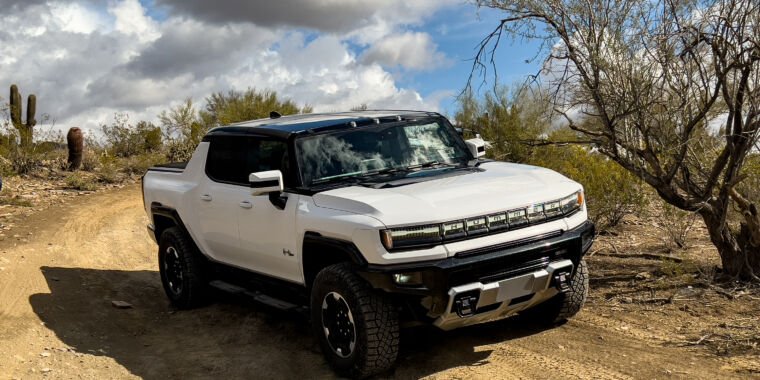- Mar 31, 2009
- 94,474
- 70,930
- 3,605
Someone should tell pknopp
He wouldn't listen, his agenda prohibits it
Follow along with the video below to see how to install our site as a web app on your home screen.

Note: This feature currently requires accessing the site using the built-in Safari browser.
Someone should tell pknopp
As far as they will take any other car.
Someone should tell pknopp
He is totally politicalHe wouldn't listen, his agenda prohibits it
He is totally political
Facts dont matter to him
Just which political party you belong to
The EV revolution is dying on the vine not because repubs are against them but because consumers are longer buying into the hype
Then dont buy a Ridgeline just as more and more people refuse to buy EV’s
Mathematically impossible. EVs are far heavier for their size than IC vehicles.
Our resident Troll strikes again.We've covered this also. They are not.

We've covered this also. They are not.


Yes they are.

The True Ramifications of EV vs. ICE / Blogs / Perficient
Today, I started to think about “The Great EV Push” and some of the differences between EVs and internal combustion engine (ICE) vehicles. When we discuss EV vs. ICE, we often focus on the driver’s experience and overcoming barriers to EV sales, which is great, but this excludes a discussion of...blogs.perficient.com

EVs are getting too heavy and too powerful, safety chief says
NTSB chief warns that heavier vehicles mean more severe injuries and deaths.arstechnica.com
The poster child for excessive EVs is the GMC Hummer EV, a monster truck with a monstrous 9,063 lb (4,110 kg) curb weight. The vehicle is still powerful enough to hurl itself to 60 mph in three seconds. Appropriately, that feature is called "WTF mode." Indeed, Homendy drew attention to the gigantic Hummer in her speech.
"Its gross vehicle weight rating is a staggering 10,550 lbs. The battery pack alone weighs over 2,900 lbs—about the weight of a Honda Civic. The Ford F-150 Lightning is between 2,000 and 3,000 lbs heavier than the non-electric version... That has a significant impact on safety for all road users," Homendy continued.
The problem is one of simple physics: All else being equal, a heavier vehicle imparts more energy during a crash than a lighter one. Speed matters, too, of course—small increases become big increases in kinetic energy during a crash. But while municipalities and states set speed limits, there isn't a similar restriction on passenger vehicle curb weights.
As far as they will take any other car. There is nothing special about any of these cars
Because obviously you use a Hummer as the standard one goes by.
You know you can't go by hardly a year without even seeing one.
The eternal cry of the ignorant. Do you think all these people are making these stories up? I've shown you the tires made special just for EVs, why, and what they cost. It has nothing to do with "politics," stupid, it has to do with the fact that the power curve of even a high performance IC car is based on an exponential curve due to the hundreds of parts in the power-train and the physics of internal combustion and gearing.
From a dead start, the closer to zero time you go, the closer to the power curve of an average car you get. It is only as time proceeds forward that higher-performance cars separate themselves in acceleration based on engine design, gearing and peak power curve. Put simply, if you have a really fast IC car, you lay rubber intentionally along well-defined tracks of acceleration as engine power ramps up to full, thus you can go easy or you can go hard, depending on whether you want to show off.
An EV car is entirely different. It operates more along a logarithmic curve. Basically, all you have is a battery and an electric motor. There is no power curve, no transmission in the conventional sense, no development of power; the pedal tells the motor how much current to dump from the battery. When you apply the "gas", the power dump to the wheel is instantaneous. If you jacked an EV up off the ground, it could go from stopped to full power/speed almost instantly--- therefore, the tire is constantly fighting between the instantaneous spin demand of the wheel changing speed under the torque of the motors and the inertia drag of the massive weight of the car.
And there is only one place for that lost energy to go: from the surface of the tire to the pavement. Unless you are very gentle and careful with an EV, it will constantly be pulling on the tire to spin as fast as the motor wants, held back only by the weight of the car and the coefficient of tire friction.
So not only will EV tires tend to cost more, but when you go out to enjoy the pleasures of driving your EV with its fast acceleration, you will be chewing your tires up. Fast IC cars may be able to go real fast real quick on purpose, but they simply lack that instant on "light switch" power to the road that is present all of the time in an EV. The only exception would be if the manufacturer puts some kind of "tire-saving" electronic mode in the car to limit the acceleration curve, but then, they would be defeating the one thing most EV owners are most interested in and impressed with.
That's simple physics. No politics needed.
All high performance cars have high performance tires that don't last many miles.
Because they are used at and rated for HIGH SPEED gumdrop. EVs will go through your tires just driving at road speed for all the reasons I already listed. And the EV tire has to deal with and support a much higher weight while doing it. But obviously, I'm talking to the wall trying to convince someone with no background in science and physics. It's not a matter of opinion son, it is an inescapable fact of physical laws. And as time goes on and more people buy and use EVs, it will become common knowledge that EVs cost much more to put tires on and will need them much more often.
Arguing with pknopp is like arguing with a pig in mud.Once again for you slow folks, and this time noting the Ford F-150 is the #1 selling vehicle in America:
The Ford F-150 Lightning is between 2,000 and 3,000 lbs heavier than the non-electric version...

I posted an inexpensive tire for a Tesla Model 3.
A Tesla Model 3 weighs appx 300lbs more than a Toyota Avalon but it has a lot more interior space.
I've done aittle better....I'm getting about 16,000....but that's it
New tires every 7,000 miles? Electric cars save gas but tire wear shocks some Florida drivers
It was love at first sight when Neil Semel saw the electric Mercedes EQS 450+ at a Pompano Beach, Florida, dealership. The sedan was the perfect sleek black color hiswww.gmtoday.com
It was love at first sight when Neil Semel saw the electric Mercedes EQS 450+ at a Pompano Beach, Florida, dealership. The sedan was the perfect sleek black color his wife wanted, had only 2,200 miles and they both liked the idea of getting away from gasoline.
“I’ve always driven combustion engines and I thought it was time to try to save the planet,” Semel said.
But after less than 5,000 miles of driving around his Boca Raton, Florida, neighborhood, Semel was shocked to find some essential — and very expensive — parts were already wearing out. The tires.
“If somebody looked at me and said, Mr. Semel, you are going to love this car but in about 7,000 miles you will have to pay 1,400 or 1,500 dollars to replace the tires, I wouldn’t have bought the car,” Semel said.
More savings from Joe Biden and the gang, but soon you will either be forced to buy an EV or take public transportation.
And no, voting won't save you. Do you really think the GOP will wave you?

Why are EV's so hard on tires?I've done aittle better....I'm getting about 16,000....but that's it